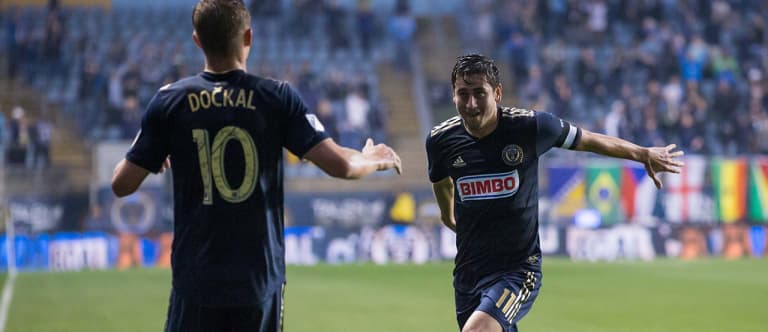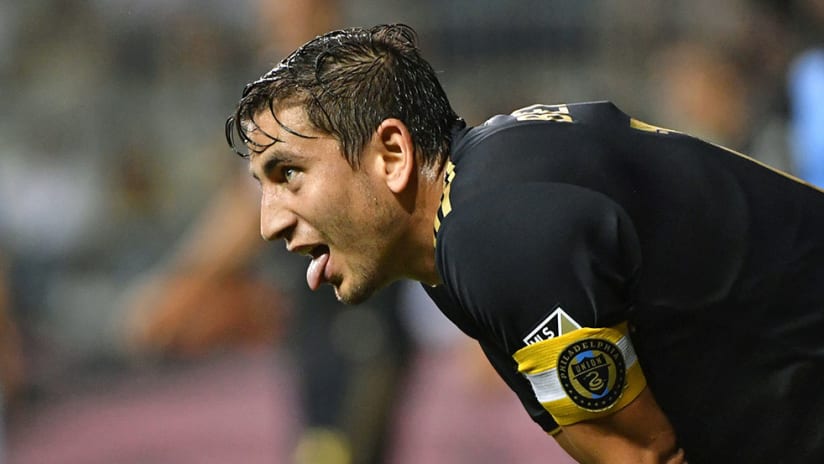CHESTER, Pa. – Eager to speak his mind, unafraid to show his emotions, brash yet unpretentious, confident but quick to point out a slight, Alejandro Bedoya is a natural fit in Philadelphia. The Union captain isn’t from Philly, but his honesty, heart and demanding style make him of the city in a way every club wishes for their leader.
His personality has always been a match here, and now, two years after he signed a Designated Player deal with the Union following almost eight years in Europe, the South Florida native feels at home in Southeastern Pennsylvania. No longer shoehorned into the No. 10 role he played at length in 2017, the longtime US international is comfortable, rid of the weight of expectations that came with being the highest-profile addition in team history and thriving as the box-to-box midfielder in Philly’s clearly-defined 4-2-3-1 system.
He’s quietly having a strong year, and the Union are looking better than they have at any point since he arrived in August 2016. Philadelphia have won three in a row and four out of five in MLS play to rise to fifth in the East, seven points above the playoff line heading into Wednesday’s match at eighth-place D.C. United (8 pm ET | TV & streaming info). They’ve got a real shot at winning the first trophy in club history on Sept. 26, when they’ll play at the Houston Dynamo in their third U.S. Open Cup final in the last five years.
“I’m settled down now,” Bedoya told MLSsoccer.com on Monday. “I’ve got my role really defined, the team has their roles really defined and I think that has helped us a lot this season.”
Definition and clarity have been major themes for the Union and Bedoya. After struggling to maintain anything resembling consistency during an up-and-down 2017, the Union have built a solid foundation this year. The offseason arrival of attacking midfielder Borek Dockal has freed Bedoya to play in his preferred No. 8 spot for the duration of the season, just in front of deeper-lying center midfielder Haris Medunjanin. That trio has been huge for Philadelphia, giving them stability and talent in the center of the field and bringing some much-needed leadership to their large cohort of young contributors.
The extra strength in the middle has also allowed head coach Jim Curtin to use the same aggressive style all season, whether the Union are playing at home or on the road. That’s a significant change from 2017 when the only earned nine away points en route to finishing eighth in the East. They’re much improved in that category this year, with their 4-7-1 away mark clocking in at fourth in the conference, just behind Atlanta and the two New York clubs.
For Bedoya, the consistent tactics and positional stability has led to a new sense of comfort. He’s been a huge part of the Union’s ability to play attractive soccer, serving as an effective bridge between Philadelphia’s young center backs and Medunjanin and Dockal and the rest of the club’s attackers. His two goals and four assists in 24 regular season appearances don’t jump off the page, but he’s excelling at the things Curtin is asking of him. He’s one of the best in MLS at shifting defenses with late, direct runs into the attacking third, ranks second among all midfielders in the league in overall passing accuracy and is third in both passing accuracy on balls in the opposing half and those ending in the final third.
This is how and where he envisioned playing when he first signed with Philadelphia. He enjoys the No. 8 spot more than a pure attacking role, where he felt expectations for his statistics (as well as those associated with his DP tag) hurt him during his first season and a half.
“Having that clear defined role, not being so caught up like I was in the beginning with this DP tag hanging over your head and you’re not expected to score every game or assist every game, all that stuff I guess in the beginning, even in the beginning of last season when I got into the No. 10, you’re expected to do all that,” he said. “Now I’ve matured in terms of I’m not worried about all that. It’s all crap. That’s more for the fans, that’s more for the people that look at goals and assists as the stats that they base players off, but I’m way more than that. Every team that I’ve played on, I’ve done my part. I know what my role is: Get the ball, get the ball forward, link defenders and forwards, attack and defense and work both sides of the ball. That’s what I’ve been doing all season.”
Just as importantly for a Union team that starts a young backline, Bedoya has developed as a leader this season. Curtin, Medunjanin and center back Auston Trusty all praised his ability connect with every part of a locker room full of big personalities, saying it’s played a large role in the success the Union have had in 2018. Bedoya himself said he’s matured since he moved to Philly, where positive developments in his personal life (he welcomed his second child after signing with the Union) have dovetailed nicely with his progress on the field.

Alejandro Bedoya, right, celebrates a goal with teammate Borek Dockal in the Philadelphia Union's 4-1 home victory over Real Salt Lake on May 19 | USA Today Images
Of course, larger questions loom over every one of the Union’s small successes. Can the club, which ranks 15th in the league in payroll, compete against the biggest spenders, like Atlanta United, New York City FC, Toronto FC, Seattle Sounders, and a few others? Philly's commitment to their academy and developing young first-teamers, begun under former sporting director Earnie Stewart and set to continue under Ernst Tanner, is paying dividends, but what are its limitations long term? Is competing for one of the final two or three playoff spots and making a run in the Open Cup their ceiling?
Bedoya, naturally, has thoughts. He’s impressed by what the club are doing with their academy and is proud to play for a team that’s producing and giving minutes to Homegrown players like Trusty, defenders Mark McKenzie and Matthew Real, and midfielder Anthony Fontana. But he’s also realistic. He knows that the Union's current model will require growing pains compared to some of their counterparts. Young players, however talented, will make mistakes, particularly on the margins. Relying on them heavily without going out and paying big bucks for a massive star potentially puts the Union at a disadvantage.
“We’ve been able to do it in a good mix, I think, but I think you can do both and it’s not like they’re mutually exclusive, you know? I think you can still have young kids coming in and spend money on DPs,” he said. “Look at the teams in the top the last couple years: Atlanta with the guys they’ve brought in, their foreign imports. New York City with David Villa, Toronto with [Sebastian] Giovinco. ... I don’t have an issue with the way we’re doing things, but I would like to spend on a big, big marquee player. It could help the squad, but at the same time we’ve got to deal with what cards we’re dealt.
“I knew that before coming here that this is what it is. Philly, even though it’s a big market, they’ve never spent like a big market team,” he continued later. “But I was well aware of that and I came here because of that challenge. I’ve always been an ambitious person, I like that challenge and I think it’s been going alright so far. There’s going to be growing pains, but when we’re clicking, we’re playing some good stuff and I know we can play with anybody in this league.”
Right now, the Union aren’t just playing with teams – they’re playing better than most. Of course, they’ve had hot stretches in previous seasons. Their challenge now is to sustain their solid form. Historically, they haven’t been able to pull that off. If they can in 2018, they’ll have a good shot at a trophy and will be a sure bet for their third trip to the playoffs. If they can carry their solid form into 2019 and beyond, if they can establish more of a culture, become more consistent and earn a little more respect, then Bedoya, who is under contract through 2019 with the Union holding an option for 2020, will be able to look back at his time in Philly as a success.
“When I came here, it was to try to put Philly more on the map as a team that gets more respect across the league and maybe in the media, whatever you want to call it,” he said. “So for me, I think a successful run with Philly after I leave here is hopefully a team that’s won a trophy, whether it’s a U.S. Open Cup or, who knows, a league or a Supporters’ Shield. But also, it’s knowing that I left here with I guess a defined style. A team that has an identity, a team that’s locked down its culture in terms of in the locker room, in terms of how we go about things. I’m a guy that always wears my emotion on my sleeve. I’m passionate and I would hope that guys in the future, when they come here they know what they’re getting into and possess the same commitment to the team and to the city and to always giving it their all and playing the way that now we’re playing.”













